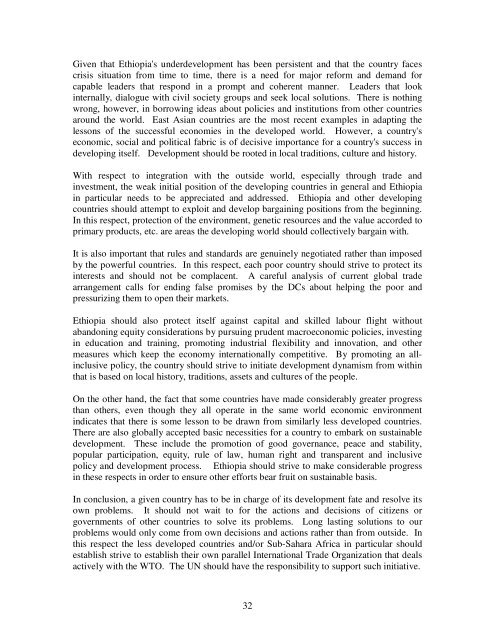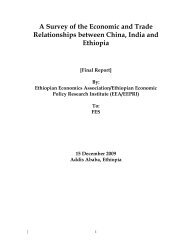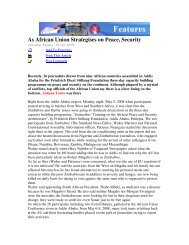external influence in the making of development ... - FES Ethiopia
external influence in the making of development ... - FES Ethiopia
external influence in the making of development ... - FES Ethiopia
Create successful ePaper yourself
Turn your PDF publications into a flip-book with our unique Google optimized e-Paper software.
Given that <strong>Ethiopia</strong>'s under<strong>development</strong> has been persistent and that <strong>the</strong> country faces<br />
crisis situation from time to time, <strong>the</strong>re is a need for major reform and demand for<br />
capable leaders that respond <strong>in</strong> a prompt and coherent manner. Leaders that look<br />
<strong>in</strong>ternally, dialogue with civil society groups and seek local solutions. There is noth<strong>in</strong>g<br />
wrong, however, <strong>in</strong> borrow<strong>in</strong>g ideas about policies and <strong>in</strong>stitutions from o<strong>the</strong>r countries<br />
around <strong>the</strong> world. East Asian countries are <strong>the</strong> most recent examples <strong>in</strong> adapt<strong>in</strong>g <strong>the</strong><br />
lessons <strong>of</strong> <strong>the</strong> successful economies <strong>in</strong> <strong>the</strong> developed world. However, a country's<br />
economic, social and political fabric is <strong>of</strong> decisive importance for a country's success <strong>in</strong><br />
develop<strong>in</strong>g itself. Development should be rooted <strong>in</strong> local traditions, culture and history.<br />
With respect to <strong>in</strong>tegration with <strong>the</strong> outside world, especially through trade and<br />
<strong>in</strong>vestment, <strong>the</strong> weak <strong>in</strong>itial position <strong>of</strong> <strong>the</strong> develop<strong>in</strong>g countries <strong>in</strong> general and <strong>Ethiopia</strong><br />
<strong>in</strong> particular needs to be appreciated and addressed. <strong>Ethiopia</strong> and o<strong>the</strong>r develop<strong>in</strong>g<br />
countries should attempt to exploit and develop barga<strong>in</strong><strong>in</strong>g positions from <strong>the</strong> beg<strong>in</strong>n<strong>in</strong>g.<br />
In this respect, protection <strong>of</strong> <strong>the</strong> environment, genetic resources and <strong>the</strong> value accorded to<br />
primary products, etc. are areas <strong>the</strong> develop<strong>in</strong>g world should collectively barga<strong>in</strong> with.<br />
It is also important that rules and standards are genu<strong>in</strong>ely negotiated ra<strong>the</strong>r than imposed<br />
by <strong>the</strong> powerful countries. In this respect, each poor country should strive to protect its<br />
<strong>in</strong>terests and should not be complacent. A careful analysis <strong>of</strong> current global trade<br />
arrangement calls for end<strong>in</strong>g false promises by <strong>the</strong> DCs about help<strong>in</strong>g <strong>the</strong> poor and<br />
pressuriz<strong>in</strong>g <strong>the</strong>m to open <strong>the</strong>ir markets.<br />
<strong>Ethiopia</strong> should also protect itself aga<strong>in</strong>st capital and skilled labour flight without<br />
abandon<strong>in</strong>g equity considerations by pursu<strong>in</strong>g prudent macroeconomic policies, <strong>in</strong>vest<strong>in</strong>g<br />
<strong>in</strong> education and tra<strong>in</strong><strong>in</strong>g, promot<strong>in</strong>g <strong>in</strong>dustrial flexibility and <strong>in</strong>novation, and o<strong>the</strong>r<br />
measures which keep <strong>the</strong> economy <strong>in</strong>ternationally competitive. By promot<strong>in</strong>g an all<strong>in</strong>clusive<br />
policy, <strong>the</strong> country should strive to <strong>in</strong>itiate <strong>development</strong> dynamism from with<strong>in</strong><br />
that is based on local history, traditions, assets and cultures <strong>of</strong> <strong>the</strong> people.<br />
On <strong>the</strong> o<strong>the</strong>r hand, <strong>the</strong> fact that some countries have made considerably greater progress<br />
than o<strong>the</strong>rs, even though <strong>the</strong>y all operate <strong>in</strong> <strong>the</strong> same world economic environment<br />
<strong>in</strong>dicates that <strong>the</strong>re is some lesson to be drawn from similarly less developed countries.<br />
There are also globally accepted basic necessities for a country to embark on susta<strong>in</strong>able<br />
<strong>development</strong>. These <strong>in</strong>clude <strong>the</strong> promotion <strong>of</strong> good governance, peace and stability,<br />
popular participation, equity, rule <strong>of</strong> law, human right and transparent and <strong>in</strong>clusive<br />
policy and <strong>development</strong> process. <strong>Ethiopia</strong> should strive to make considerable progress<br />
<strong>in</strong> <strong>the</strong>se respects <strong>in</strong> order to ensure o<strong>the</strong>r efforts bear fruit on susta<strong>in</strong>able basis.<br />
In conclusion, a given country has to be <strong>in</strong> charge <strong>of</strong> its <strong>development</strong> fate and resolve its<br />
own problems. It should not wait to for <strong>the</strong> actions and decisions <strong>of</strong> citizens or<br />
governments <strong>of</strong> o<strong>the</strong>r countries to solve its problems. Long last<strong>in</strong>g solutions to our<br />
problems would only come from own decisions and actions ra<strong>the</strong>r than from outside. In<br />
this respect <strong>the</strong> less developed countries and/or Sub-Sahara Africa <strong>in</strong> particular should<br />
establish strive to establish <strong>the</strong>ir own parallel International Trade Organization that deals<br />
actively with <strong>the</strong> WTO. The UN should have <strong>the</strong> responsibility to support such <strong>in</strong>itiative.<br />
32







